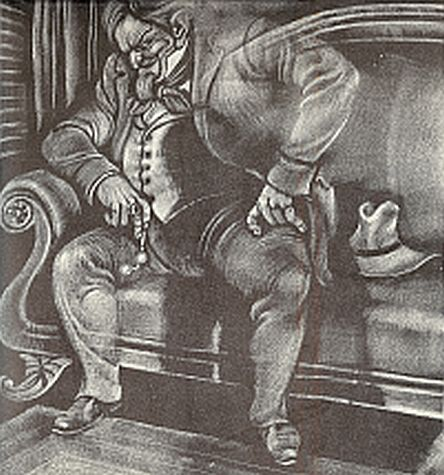Konstantin Levin, a major character in Tolstoy's War and Peace reflected on God's supreme irony - having created Man as an intelligent, insightful, creative, capable, and supremely endowed being, gave him but a few decades to live and then consigned him to eternity in the cold, hard ground of the steppes.
Others like modern author Phillip Roth, who in his book The Human Stain similarly reflected on this same irony but brought it from the general to the specific. Why had God created men with a lifelong sexual desire and given them the same few, paltry decades to be able to satisfy it? 'She might not be my first love', says Roth's aging Coleman Silk character, 'nor my best love; but she certainly is my last love. Doesn't that count for something?'
Silk like other older men who have found young love as they move into their last years of life, felt himself lucky and blessed. Somehow in this routine, faulty world, an unexpected, joyful gift can be given. It is not so much that death has been cheated, muses Silk, but that life has been affirmed.
Ivan Karamazov's Devil in Dostoevsky's The Brothers Karamazov is a self-described vaudevillian, on earth among human beings to be devilish, to upset the sanctimony of God-fearing believers, and to show the world that God's Creation included him, the Devil, mischief, and laughable, surprise endings. Life without him would be an 'endless church service', an unlivable, tedious bore. God created me after all, says the Devil, 'doesn't that tell you something?'
Indeed it does, for the God of the Old Testament is far more understanding of the human condition he created than his censorious and unapologetically good Son. When God directs Moses to lead his people out of Egypt, Moses declines. I am not your man he says. I stutter, have no way with words. I am only a simple man; but God rejoins him with slight reproach. Remember who I am, says God - I created you, the Jews, the Egyptians, and the Sinai, and so the vaudevillian act continues until Moses realizes he has no choice but to chance the adventure and fight his way to Jericho.
Moses, after his successful cavalcade north and the return of the Jews to Israel, gets demanding. When God tells him of his intention to destroy Sodom and Gomorrah, he replies 'Why bother?' and reminds him of The Flood, 'A lot of good that did'. There is not a little self-interest in Moses' attempt to deter God. He might wipe us all out again, if I am not careful. What is a little lechery in the scope of things? Why get so exercised when your entire kingdom is back where it was before the flood? Accept that you made a few mistakes and live with it.
Job has his chance to engage God who in a capricious, spiteful, and uncontrite way makes him suffer until he finally bows to his majesty. The interchange is lively, salient, and compelling. Job is not so much patient as he is defiant, calling out God for his nonsense. The irony is not lost - a god which created the universe is so petty, self-absorbed, and niggling that he has to pick on people?
Dostoevsky picks up where the Bible left off. Why on earth would this powerful, righteous god create someone like me, the Devil asks? He must have had a good reason. If the world is to be irremediably a messy place, then why not admit the comedy?
Did Jesus have a sense of humor? There are two quick answers to the question. The first is, “Of course not”. There was absolutely nothing funny about his mission – la via dolorosa, the Crucifixion, and the enormous responsibility of dying for the sins of all men.
The second answer is, “Of course he did”. He might have been divine, but he was also human, and a sense of humor is one of humanity’s most characteristic traits. At some point even the sourest, pinched, and humorless person has to laugh.
The fact is that none of the Gospels or the epistles record a funny or laughing Christ. He neither makes others laugh nor finds anything to laugh at. Some critics infer from the tales of his journey from Galilee to Jerusalem that he must have enjoyed himself. At the many banquets described in the New Testament, could he have always kept a straight face? Or not shared in a joke?
Was there no bantering and joking between him and his disciples like there almost always is when men get together? Was everything in the three years recorded in the Gospels such a serious affair? Surely, even a man on a mission as revolutionary as his could not have thought only of his Father, his being, and his divine purpose. If God indeed created him as a man, then he must have given him room for comic pause.
Jesus’ humanity was essential to the Kingdom. The sins of the world were so many, so offensive, ignorant, and insulting to his Father, that only a horrific suffering would suffice. Although he could have given a universal spiritual amnesty to sinners, he chose a painful death to exemplify the nature of a true Christian (i.e. selfless, obedient, and penitent). There is no doubt that Christian tradition values both Christ’s divinity and his humanity.
Whether or not Jesus was funny is not the point. If he was human, of course he was. All of us know that everything is funny. Mel Brooks found the Nazis funny:
Germany was having trouble
What a sad, sad story
Needed a new leader to restore
Its former glory
Where oh where was he?
Where could that man be?
We looked around and then we found
The man for you and me and now it's
Springtime for Hitler and Germany
Deutschland is happy and gay
We're marching to a faster pace
Look out, here comes the master race
A story, whether myth or revelation, is still a story, and one surprisingly has no warts, bad teeth, stumbling, banana peels, clowns, mishaps and misadventures of life. How can life be such a side show and the Bible so serious?
How can life itself be taken so seriously when it is, by and large, a three-ring circus?
Every major philosopher has tussled with this conundrum - why did God create such a discombobulated, random, senseless world and then demanded so much from it? Why after twice giving up and wiping out the human beings he created (Noah and Sodom), and after in desperation sending his only begotten son to straighten things out only to watch him die for his efforts leaving behind the same irreparable world he created?
The torturous arguments given by true believers belie belief. God of course knew what he was doing, but did it anyway to create the suffering needed for salvation. 'What?', shouts Ivan Karamazov. 'What about the children?', and he goes on to chronicle a litany of horror, mutilation, rape, mental cruelty, and abuse, all of which he, God, could have prevented. Not only that Jesus scammed his people suggesting that one does not live alone; but consigning them to an empty desperate life of Mystery, Miracles, and Authority paving the way for the autocratic, manipulative Church.
If the world was randomly created, then the nonsense of life is completely understandable, and one should laugh at it at best. If it was created by an all-powerful, all-knowing God, then he must have had an ironic sense of humor.








No comments:
Post a Comment
Note: Only a member of this blog may post a comment.